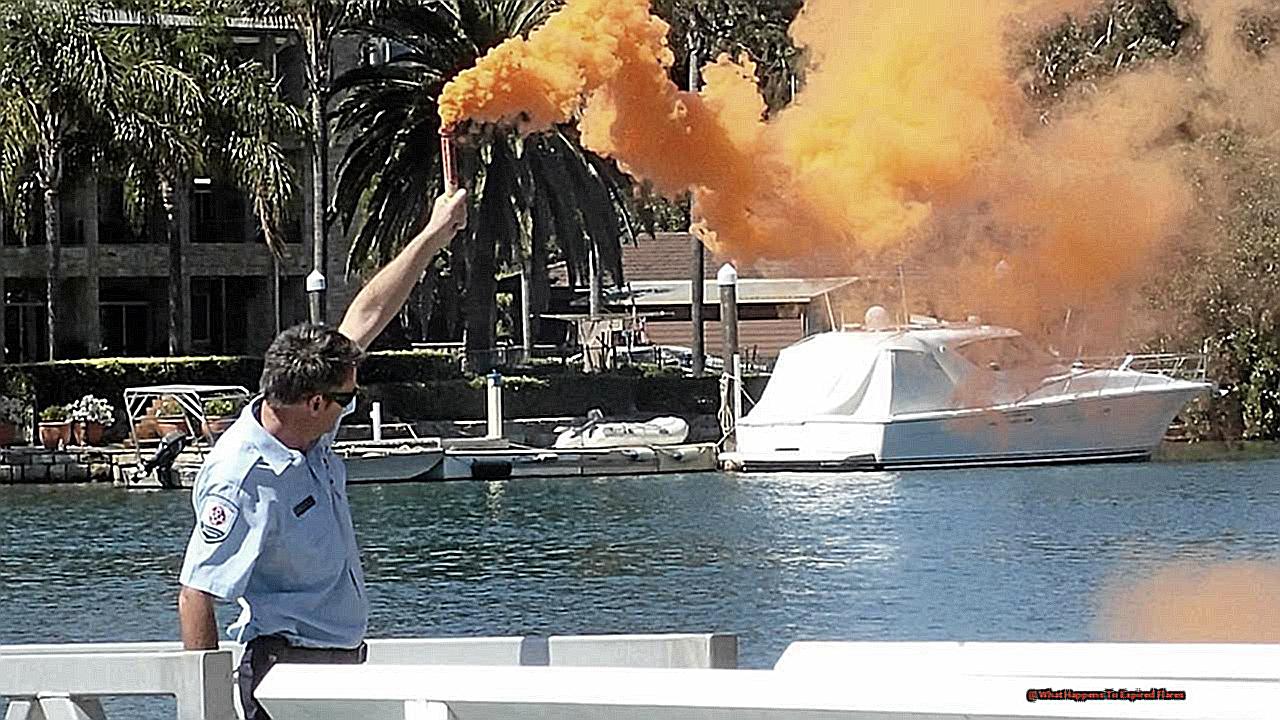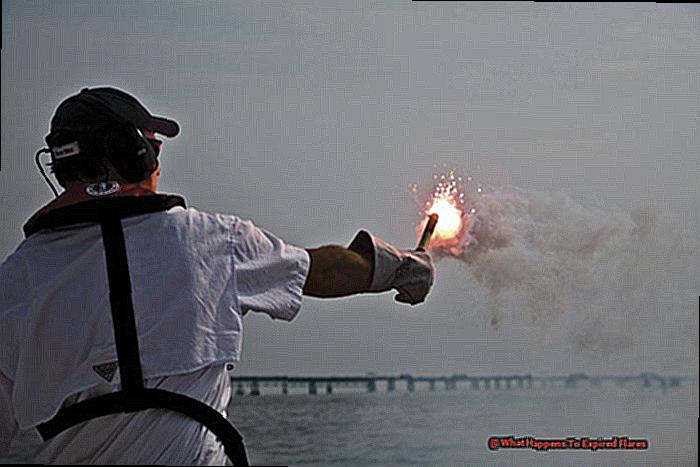We’ve all seen them on boats, tucked away in emergency kits, waiting for the day they’ll be needed. But what happens when that expiration date comes and goes?
Do they simply get tossed aside like an old toy, forgotten and useless? As a lover of all things nautical, I couldn’t help but wonder about the fate of these once vital safety tools.
So join me as we explore the journey of expired flares – from their bright beginnings to their mysterious end. Ready to set sail on this adventure?
Let’s go.
What Happens To Expired Flares?
Contents
- 1 What Happens To Expired Flares?
- 2 The Importance of Expiration Dates on Flares
- 3 Types of Expiration Processes for Flares
- 4 Potential Dangers of Using Expired Flares
- 5 Proper Disposal Methods for Expired Flares
- 6 Alternatives to Using Expired Flares in Emergencies
- 7 The Environmental Impact of Improperly Disposing of Flares
- 8 Conclusion
Flares are an essential tool for signaling distress in emergency situations, whether at sea or on land. But did you know that flares also have an expiration date? Just like any other product, flares can lose their effectiveness over time, making it crucial to dispose of them properly. So what exactly happens to expired flares? Let’s dive into the details.
Why Do Flares Have an Expiration Date?
Before we get into what happens when flares expire, let’s understand why they have an expiration date in the first place. Flares contain chemicals that produce the bright light and smoke when ignited. Over time, these chemicals can degrade, making the flare less effective and reliable. The expiration date serves as a safety precaution, ensuring that the flares are in good working condition when needed.
What Happens When Flares Expire?
The answer to this question may vary depending on the type of flare and its components. However, one thing is certain – expired flares are not as effective as new ones and can even pose a safety risk if not disposed of properly. As the chemicals inside the flare deteriorate, they can become unstable, increasing the risk of accidental ignition or even explosion. This poses a risk not only to the person handling the flare but also to others in the surrounding area.
Proper Disposal Is Crucial

Now that we understand why it is essential to dispose of expired flares let’s talk about how to do it correctly. First and foremost, do NOT throw them in the trash or burn them. These methods can release harmful chemicals into the environment and put you and others at risk. Instead, take them to a licensed hazardous waste facility or contact local authorities for guidance on disposal.
Protecting the Environment
Proper disposal of expired flares is not just about safety; it’s also about protecting the environment. Flares contain hazardous materials that can be harmful to marine life if they end up in bodies of water. These chemicals can also contaminate soil and groundwater if not disposed of correctly. By disposing of expired flares properly, we can help prevent these harmful effects on the environment.
The Importance of Expiration Dates on Flares
As boaters, we understand the importance of being prepared for any emergency while out on the water. We have life jackets, first aid kits, and other safety equipment on board. But what about our flares? Many of us may not give much thought to the expiration dates on flares, but the truth is, they are there for a reason.
Flares have expiration dates to ensure their effectiveness and safety. Manufacturers determine these dates based on the chemical composition and stability of the flare. Using expired flares can result in unreliable or non-functioning signals, putting lives at risk. This is why the Coast Guard requires all vessels to have flares with valid expiration dates on board and conducts regular inspections to ensure compliance.
But it’s not just about following regulations. The expiration date also indicates when the flare can no longer legally be used for distress signals. While expired flares may still technically work, they may not meet the standards set by the Coast Guard and other regulatory bodies.
It’s important to note that different types of flares may have different shelf lives. For example, handheld flares typically have a shorter lifespan compared to aerial flares. It’s crucial to check the expiration date on each individual flare before heading out on a boating trip.
Proper storage and handling can also affect the lifespan of flares. Exposure to extreme temperatures, moisture, and sunlight can degrade the chemicals in the flare, rendering it ineffective. It’s essential to store flares in a cool, dry place and handle them with care.
So what should you do if you come across expired flares? First and foremost, do not attempt to use them for distress signals. Instead, contact your local Coast Guard station or fire department for guidance on how to properly dispose of them. Throwing them in the trash or overboard is not only dangerous but also harmful to the environment.
Types of Expiration Processes for Flares
Flares are essential emergency signaling devices used in situations of distress or danger. They emit a bright light and smoke, making them visible from a distance. However, just like any other product, flares also have a shelf life. In this blog post, we will delve into the different types of expiration processes for flares and the importance of proper disposal methods for expired flares.
There are two main types of expiration processes for flares
chemical decomposition and physical degradation. Chemical decomposition occurs when the chemicals in the flare mix begin to break down and lose their effectiveness. On the other hand, physical degradation happens when the components of the flare, such as the casing or igniter, deteriorate due to exposure to elements like moisture or sunlight. Both types of expiration can affect the performance and reliability of flares, making them less effective in emergency situations.
But what happens when flares expire? Depending on the type of flare, the expiration process may vary. For example, hand-held flares contain potassium nitrate, which can become unstable over time and cause them to malfunction or even explode. On the other hand, parachute flares may lose their brightness or fail to ignite due to chemical reactions within the flare.
Using expired flares can be extremely dangerous. They can malfunction or even explode, causing harm to the user and others in the vicinity. This is why it is crucial to dispose of expired flares properly rather than trying to use them in an emergency situation.
So how should you dispose of expired flares? The most recommended method is to take them to a hazardous waste facility or contact local authorities for guidance on disposal. It is not safe to throw expired flares in the trash or burn them as they can release harmful chemicals into the environment.
In addition, it is crucial to keep track of expiration dates for flares and dispose of them before they expire to avoid any potential risks or hazards. This includes properly storing flares in a cool, dry place and regularly checking for any signs of damage or expiration.
In case of an emergency where flares are needed but none are available, there are alternative signaling methods that can be used such as signal mirrors, whistles, or distress flags. It is always important to have a backup plan in case flares are not an option.
Potential Dangers of Using Expired Flares
Don’t let expired flares be a danger to you and those around you. As an expert on this matter, I have seen firsthand the potential dangers of using expired flares. From malfunctioning and fire hazards to toxic fumes and legal consequences, the risks associated with outdated flares are not to be taken lightly.
The primary danger of using expired flares is the risk of them not functioning properly. Flares contain a chemical mixture that can deteriorate over time, resulting in a weaker or even non-existent flare. This can be especially dangerous in emergency situations where a reliable signal is crucial.
But that’s not all – expired flares can also pose a fire hazard. As the chemicals inside the flare degrade, they can become unstable and potentially ignite without warning. This is particularly concerning if the flare is being stored in a confined space, such as a boat or backpack.
Furthermore, using expired flares may emit toxic fumes when lit. These fumes can be harmful to both the user and those around them. Imagine being stranded and in need of rescue, only to find out that your outdated flare is releasing harmful gases instead of signaling for help.
It’s important to note that even if expired flares do produce a visible signal, they should not be relied upon in an emergency situation. They may not be as bright or long-lasting as fresh flares, making it more difficult for rescuers to spot and respond to the distress signal.
Not only are expired flares dangerous, but they can also lead to legal consequences. In many countries, it is illegal to use expired flares as they are considered hazardous materials. If caught using outdated flares, individuals may face fines or even criminal charges.
Proper Disposal Methods for Expired Flares
If so, it’s time to take action. As an expert on proper disposal methods for expired flares, I can’t stress enough the importance of getting rid of these dangerous items before they cause harm. In this blog post, I will provide you with all the information you need to safely dispose of expired flares and avoid potential hazards.
Why do we need to dispose of expired flares?
First and foremost, let’s address the question on everyone’s mind – why do we need to dispose of expired flares in the first place? After all, they may still look functional and usable. However, the main reason for disposing of expired flares is that the chemicals inside them can become unstable over time. This means they may malfunction or ignite unexpectedly, causing harm to yourself and those around you.
How can you dispose of expired flares?
Now that we understand the potential dangers of using unstable flares, let’s discuss the best ways to dispose of them. Here are some options:
- Contact your local waste management agency: Many local governments have programs in place for disposing of hazardous materials, including expired flares. Contact your local waste management agency to inquire about their disposal process.
- Reach out to the manufacturer: Some companies have take-back programs in place for their products, where you can return the expired flares to them for proper disposal. Check with the manufacturer of your flare to see if they offer this service.
- Seek guidance from fire or Coast Guard stations: If neither of the above options are available to you, try contacting your local fire department or Coast Guard station for guidance on how to safely dispose of your expired flares.
- Soak in saltwater before disposing: If you cannot find a proper disposal method, it is recommended to soak the flare in saltwater for 24 hours before disposing of it in a landfill. This will help neutralize any remaining chemicals inside the flare.
What NOT to do when disposing of expired flares?
It is important to never throw expired flares in the trash or in a body of water. This can create a safety hazard and harm the environment. Also, never attempt to burn an expired flare as a means of disposal – this can be extremely dangerous and should only be done by professionals.
Alternatives to Using Expired Flares in Emergencies
As an outdoor enthusiast, you know the importance of being prepared for emergencies. That’s why you always carry flares with you on your adventures. However, have you ever checked the expiration date on your flares? If not, you may be carrying around a ticking time bomb without even realizing it.
Expired flares can pose a serious danger in emergency situations. But fear not, as an expert on proper disposal methods, I’m here to share valuable insights and practical solutions for disposing of expired flares.
Why do flares expire?
Before we dive into disposal methods, let’s first understand why flares have an expiration date. Flares contain chemicals that react with each other to create the bright light and smoke. Over time, these chemicals can degrade and become less effective, rendering the flare useless in an emergency.
Proper disposal methods
The most important thing to remember when disposing of expired flares is to never throw them in the trash or flush them down the toilet. This can lead to potential fires or harm to the environment. Instead, contact your local hazardous waste disposal facility for guidance on how to safely dispose of them.
But wait, before you dispose of them, consider these alternative uses for expired flares.
Donate them
Expired flares can still be used for training purposes by local fire departments or search and rescue organizations. Before donating, make sure to check with the specific organization as they may have different policies regarding expired flares.
Educational purposes
Flares can serve as visual aids in safety classes or demonstrations on how to properly use them in emergency situations. This can help raise awareness about flare safety and disposal methods, ultimately promoting safety in outdoor activities.
Personal use
You can also repurpose expired flares for personal use, such as using them as decoration or in DIY projects. However, caution should be taken when handling expired flares as they may still pose a fire hazard.
Take action now
Don’t let expired flares be a danger to yourself and others. Take action now by properly disposing of them or considering alternative uses. Remember, disposing of expired flares is like diffusing a ticking time bomb – it must be done carefully and responsibly.
The Environmental Impact of Improperly Disposing of Flares
As boaters, we all know the importance of safety equipment on board. One of these essential items is flares, which can be used as a distress signal in emergency situations. But what happens when these flares expire? Many people may not realize the potential harm that can come from improperly disposing of expired flares. In this blog post, we will discuss the environmental impact of improperly disposing of flares and why it is crucial to follow proper disposal methods.
The Consequences of Improper Disposal:
When flares expire, they are no longer effective for their intended purpose. However, they still contain hazardous chemicals that can harm the environment if not disposed of correctly. These chemicals, such as potassium perchlorate and sulfur, can leach into the soil and water if thrown away with regular trash. They can also release toxic fumes when burned, contributing to air pollution. This poses a significant risk to wildlife and can have long-term effects on our ecosystem.
The Dangers to Marine Life:
Improperly disposing of flares can also have a devastating impact on marine life. Many boaters may be tempted to throw expired flares into bodies of water, thinking it is a quick and easy way to get rid of them. However, these chemicals can harm aquatic organisms and disrupt the delicate balance of our oceans. Marine animals may mistake the bright colors for food or become entangled in the debris, leading to injury or death.
Proper Disposal Methods:
To ensure the safety of our environment, it is crucial to follow local regulations for disposing of flares. Many organizations, such as boat clubs or marinas, have programs in place for collecting expired flares from their members and disposing of them properly. Local fire departments or hazardous waste facilities may also offer similar services. It is essential to research and follow the specific disposal methods for your location to minimize the environmental impact.
Repurposing Expired Flares:
In some cases, expired flares can be repurposed for alternative uses, such as signaling devices in non-emergency situations or as part of a survival kit. However, it is crucial to check with local authorities before using them for any other purpose to ensure it is legal and safe.
Conclusion
In conclusion, the destiny of expired flares may seem shrouded in uncertainty, but it is one that must not be ignored. These once essential safety devices can transform into hazards if not disposed of correctly. Through chemical breakdown and physical deterioration, expired flares can present dangers such as malfunctioning, fire risks, and toxic emissions. It is imperative to adhere to proper disposal methods to safeguard ourselves and the environment.
Remember, discarding expired flares in the trash or burning them is not only perilous but also detrimental to our surroundings. Instead, seek guidance from local authorities or hazardous waste facilities on how to dispose of them safely. Let’s do our part in preserving our oceans and marine life by avoiding improper disposal methods that can have catastrophic consequences.
So next time you encounter an expired flare, keep in mind the potential perils it carries and take action to dispose of it responsibly. And don’t forget – regularly checking expiration dates and storing flares properly can prevent these risks from arising in the first place.





